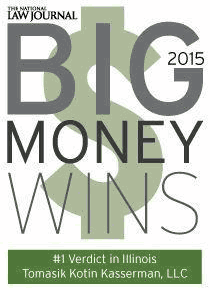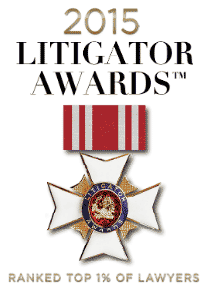$26M Verdict Upheld in Taxi Crash Suit
CHICAGO, IL, MARCH 21, 2017 - CHICAGO DAILY LAW BULLETIN
By David Thomas
A taxi company remains on the hook for a jury verdict of nearly $26 million after a divided state appeals panel found the driver was acting as an apparent agent of the business during a 2005 collision.
Marc M. Jacobs, a former partner with Barack, Ferrazzano, Kirschbaum & Nagelberg LLP, suffered a traumatic brain injury during the car crash while riding in a Yellow Cab Affiliation Inc. taxi that vaulted off a ramp along the Tri-State Tollway near west suburban Hinsdale and slammed into a retention wall.
The taxi Jacobs hired on Aug. 31, 2005, was not owned by Yellow Cab, though its name and logo were emblazoned on the vehicle.
During a two-week trial in March 2015 at the Daley Center, Jacobs testified he deliberately chose to ride in Yellow Cab-branded cars over any kind of taxi.
He testified that he suffers from retrograde amnesia, meaning he cannot remember the collision or the weeks leading up to it. He is also easily overwhelmed by lights and music and he will forget conversations if people interrupt him while talking.
As a result of his injuries, Jacobs has been unable to continue his law practice.
At trial, Yellow Cab sought to introduce evidence and testimony arguing that Chicago regulations dictated the physical appearance of its cabs and that it had no control over how its affiliated cabs looked.
But Cook County Circuit Judge Daniel Joseph Lynch barred Yellow Cab from introducing the evidence, deeming it irrelevant and confusing to the jurors.
The jury awarded Jacobs $21.98 million for his injuries and $3.96 million to his wife Deborah, who sued for a loss of consortium.
The jury also found in three special interrogatories that Yellow Cab did hold itself out as a provider of taxi services, that Jacobs did not know driver Cornelius C. Ezeagu was not an employee of Yellow Cab and that Jacobs relied on the company for its services.
Ezeagu and Yellow Cab appealed the verdict.
On appeal, the 1st District majority found Yellow Cab was liable for the accident because it displayed itself to customers as Ezeagu’s apparent employer.
Justice Margaret Stanton McBride authored the opinion and Justice David Ellis concurred.
“YCA knew that prospective customers, including Jacobs, would believe YCA owned and/or controlled the distinctive yellow colored cabs that were operating in Chicago,” McBride wrote in the 67-page majority opinion. The panel refers to Yellow Cab as YCA throughout the ruling.
The majority found nothing in Chicago’s code that mandated Yellow Cab “use the same distinctive color scheme and nearly the same logo that was used historically by its predecessor.”
Rather, it found Yellow Cab chose to use its look because customers associated the brand with an expected service or experience — a factor Jacobs cited when he testified he chose to hire a Yellow Cab car over other available options.
“YCA’s choice of identifying characteristics is material because that choice is what created the appearance that Ezeagu was YCA’s agent,” McBride wrote. “YCA’s liability to the Jacobses is not based on its involuntary compliance with the code, as it now argues, but on its affirmative and voluntary choice, independent of any legal requirement, of a certain color scheme and logo.”
Justice Cynthia Y. Cobbs wrote a 16-page dissent that suggested the court should remand the case for a new trial. She took aim at Lynch’s refusal to allow Yellow Cab’s testimony on Chicago taxi regulations.
Cobbs wrote it was “nonsensical” to deny Yellow Cab the ability to introduce evidence showing how Chicago regulated the external appearance of the cab Jacobs entered outside Joe’s Seafood, Prime Steak & Stone Crab in River North in 2005.
“The question before the jury should have been whether the aspects of the taxicab’s appearance that were the result of YCA’s voluntary conduct established ‘holding out,’” Cobbs wrote.
If the city mandated the cab’s appearance, it wouldn’t reflect on the company’s voluntary conduct.
“It is fundamentally unfair to allow plaintiffs to ask questions about aspects of the appearance that the [Chicago Municipal Code] required, but then prevent YCA from explaining they were mandatory,” Cobbs wrote.
Cobbs wrote that without such evidence, the question of agency was essentially removed from the jury’s hands.
“My disagreement with the majority rests on my belief that the resolution of the question of whether YCA has held itself out as an apparent principal was for the jury and not for the court to decide,” Cobbs wrote. “I do not mean to suggest that admission of the code evidence would have precluded a finding of apparent agency in this case. Without it, however, no other finding was possible.”
Cobbs wrote the majority placed too much emphasis on Jacobs’ habits of using Yellow Cab-branded cars for transportation and whether he thought Ezeagu was a Yellow Cab employee.
“If that were the case, defendants would be strictly liable for the torts of others whenever their name appears on a vehicle that another person is driving, regardless of who put it there and whether they had knowledge of the appearance,” Cobbs wrote.
Cornelius E. McKnight, a founding partner at McKnight Kitzinger and Pravdic LLC and one of Ezeagu’s attorneys, said his client plans to file an appeal with the Illinois Supreme Court. He indicated the argument will center around a special interrogatory Lynch did not allow his client to ask during the trial.
Ezeagu sought to ask the jury two questions regarding its views on the proximate cause of Jacobs’ injuries. Lynch blocked those questions.
Had the jury answered yes, on those questions, it would have held Jacobs responsible for his injuries, thus reducing the amount of money he could be awarded.
All three judges on the appeals panel found that the interrogatories Ezeagu sought were essentially too complex. As McBride noted on the second question, “the language was so broad that a responsive answer would not necessarily be inconsistent with a general verdict.”
In an interview, McKnight maintained the panel misconstrued the primary argument and signaled it will be a key point in arguments before the high court.
“It’s our position the court is obligated to give the special interrogatory to answer the ultimate question of whether one party is ultimately responsible over the other,” McKnight said.
The Jacobses still have not received any of the $26 million judgment. On March 17, 2015, the day after the verdict was entered, Yellow Cab declared Chapter 11 bankruptcy in federal court, putting a freeze on any money the cab company pays out to its creditors, including the plaintiffs.
The bankruptcy proceedings in Yellow Cab Affiliation, Inc., 2015-bk-09539, are still ongoing, according to Timothy S. Tomasik, a partner at Tomasik Kotin Kasserman LLC.
“Yellow Cab and their many closely associated companies have substantial assets, and we are confident that when the bankruptcy and all other proceedings are concluded, that our clients will be made whole,” Tomasik said.
“We think the majority got it right. It was a very interesting trial, with a proper outcome from a jury resolving multiple questions of fact,” Clifford said. “This cab ran into a wall, spinning out of control, and ended a man’s legal career.”
Clifford expressed confidence his client would prevail if the state Supreme Court took up the case.
Ezeagu was also represented by Kevin Q. Butler, Stanley A. Kitzinger, Nathan P. Karlsgodt and Joanne Krol of McKnight, Kitzinger & Pravdic LLC. They did not return a request for comment.
Yellow Cab was represented by Steven R. Bonanno, Carlton D. Fisher and Anne C. Couyoumjian of Hinshaw & Culbertson LLP and Richard C. Godfrey, R. Chris Heck and Catherine L. Fitzpatrick of Kirkland & Ellis LLP. Godfrey declined to comment.
The Taxicab, Limousine & Paratransit Association, which filed an amicus curiae brief in support of Yellow Cab, was represented by Arthur L. Herold of Washington, D.C.-based Webster Chamberlain & Bean LLP.
The case is Marc M. Jacobs, et al., v. Yellow Cab Affiliation, Inc., 2017 IL App (1st) 151107.

 312-605-8800
312-605-8800




 312-605-8808
312-605-8808






